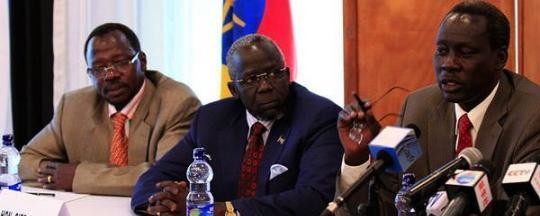The SPLM-Leaders delegation at South Sudan’s peace talks in Addis Ababa want the IGAD mediation’s proposal on transitional arrangements to limit the powers of President Salva Kiir, whose constitutional term in office ends within less than a year.
Last month the East African mediators prepared a document called the Protocol on Agreed Principles on Transitional Arrangements, which reaffirmed the role of Salva Kiir as “Head of State and Government.” The protocol would keep him in power for about two years longer than his elected term.
In written observations on the proposal, the SPLM-Leaders delegation leader Deng Alor Kuol said that the president should not be maintained as head of government, but only as ‘Head of State.’
This could potentially relegate the president to a more ceremonial role while others carry out the functions of actual governance.
“The Protocol has ignored the consensus reached by the stakeholders in the thematic committees formed by the IGAD Envoys. The Political Committee on transitional Governance Arrangements unanimously agreed on the formula for power sharing between the President and the Prime Minister during the Transitional Period,” writes Deng Alor.
“The Protocol confirmed President Kiir as both the Head of State and Government. The consensus of all stakeholders, except the Government delegation, was for the Prime Minister to be the Chief Executive in charge of the day to day running of the Government while the President performs the functions of Head of State,” he added.
Deng Alor said this arrangement was to stop the war and allow for a “peaceful transition to a permanent and sustainable political dispensation.”
He also objected to a provision in the protocol that allows the president “the power to veto the nomination of the SPLM/A (IO)” for the position of the Prime Minister. This is a reference to a clause within paragraph 3 of the Protocol, which states that the Prime Minister shall be nominated by SPLM-IO and “shall be acceptable to the President.”
This provision effectively ensures that Riek Machar cannot become the Prime Minister because of his intense personal feud with the President.
Deng Alor comments that under the terms of the Protocol Machar is “completely excluded from the leadership of the transitional Government of National Unity, without giving him the option to participate or not.”
He also objects to a provision that the transitional Prime Minister will not be allowed to run for public office at the end of the transitional period. He says that this condition should either be removed or should be applied without exception to the top three positions in the government.
The SPLM-Leaders faction also want the Protocol to create one or two deputies for the prime minister. “The position of the stakeholders was based on the tasks to be undertaken by the office of the Prime Minister as head of government. We still think that the Prime Minister shall have two or one Deputy Prime Minister.”
Deng Alor urged the IGAD leadership to consider his recommendations as they prepare for more peace talks, which are sceheduled to resume later this month after an adjournment of several weeks.
SPLM-Leaders, also referred to as the ‘Former Detainees’ group, is a non-armed faction of South Sudan’s now split ruling party. The group includes the erstwhile SPLM secretary-general Pagan Amum, a former Lakes State governor, the former deputy defense minister, the former National Secuirty minister, and several other former senior officials.
File photo: Deng Alor (right)




